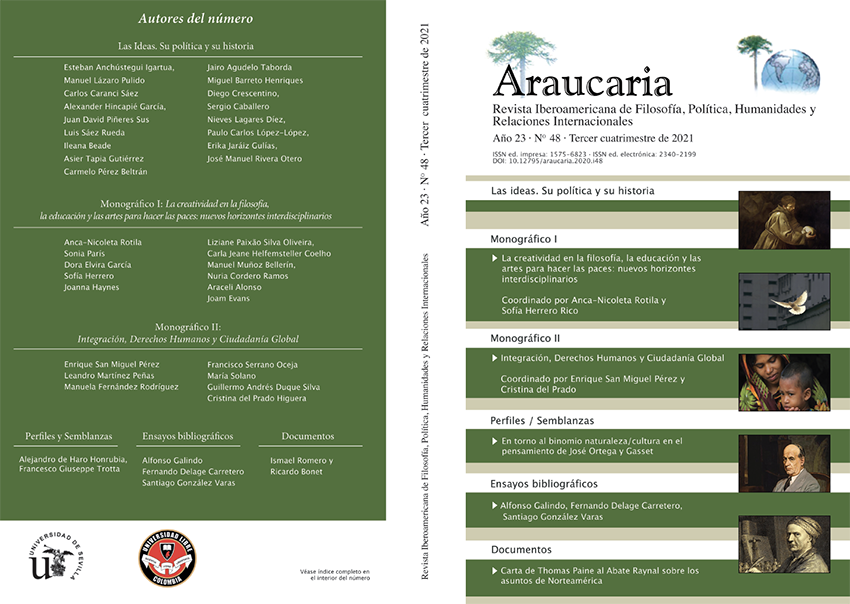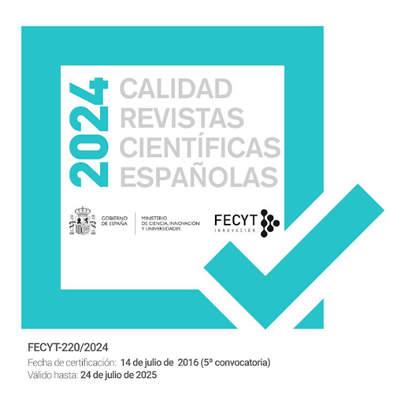Theatre as Place of Reconciliation: the Experience of Victus in Colombia
DOI:
https://doi.org/10.12795/araucaria.2021.i48.09Keywords:
reconciliación, arte, teatro, Colombia, posacuerdo, posconflictoAbstract
Reconciliation is one of the greatest challenges in Colombia’s postagreement scenario. This paper will focus on the case study of “Victus”, a theatre company, composed by victims and former combatants of various armed groups (guerrilla, paramilitary, army). It will sustain that this artistic experience configures a “micro-laboratory” of reconciliation in which a common space of interaction allows actors to transcend the borders of the armed conflict, to humanize the “other”, and to generate multiple processes of transformation and peacebuilding.
Downloads
Metrics
References
Barreto Henriques, Miguel (2012) “La paz de los “pequeños nadas”: una mirada desde los Laboratorios de Paz en Colombia”, Revista Javeriana, Octubre, nº 789, Año 79, Bogotá, pp. 64-77
Cohen, Cynthia, Gutiérrez, Roberto & Walker, Polly (ed.) (2011) Acting Together: Performance and the Creative Transformation of Conflict, EUA: New Village Press
Cox, Robert (1981) Social Forces, States and World Orders: Beyond International Relations Theory. Millennium 10 (2), 126–155.
Derrida, Jacques (2012) Pardonner: L'impardonnable et l'imprescriptible, Paris: Éditions Galilée
Fisas, Vicenç (2006) Cultura de paz y gestión de conflictos, Barcelona: Icaria
Galtung, Johan (1996) Peace by peaceful means: Peace and Conflict, Development and Civilization, London: Sage Publications
Galtung, Johan (2015) “Peace, Music and the Arts: In search of interconnections” in Urbain, Olivier (ed.) Music and Conflict Transformation: Harmonies and Dissonances in Geopolitics, Londres: Tauris, pp 53-60
Govier, Trudy & Verwoerd, Wilhelm (2002), “Trust and the Problem of National Reconciliation”, Philosophy of the Social Sciences, June, vol. 32, no. 2, pp. 178-205
Lederach, John Paul (1997) Building Peace: Sustainable Reconcilitation in divided societies, Washington, D.C.: United States Institute of Peace Press
Lederach, John Paul (2003), The Little Book of Conflict Transformations, Good Books
Lederach, John Paul (2008), La imaginación moral: el arte y el alma de construir la paz, Bogotá: Grupo Editorial Norma
Lederach, John Paul (2015) “La verdadera reconciliación pide que recordemos y cambiemos”, in Reconciliación: el gran desafío de Colombia, Bogotá: Semana Libros
Muñoz, Francisco (ed.) (2001) La paz imperfecta. Granada
Palacios, Claudia (2016) Perdonar el imperdonable: Crónicas de una paz posible, Bogotá: Planeta
Real Academia Española (RAE) (2020) Diccionario de la lengua española, “empatía” in https://dle.rae.es/empat%C3%ADa
Rettberg, Angelika & Ugarriza, Juan (2016) “Reconciliation: A comprehensive framework for empirical analysis”, Security Dialogue, vol. 47 (6), 517-540
Tanabe, Juichiro (2016) “Buddhism and Peace Theory: Exploring a Buddhist Inner Peace”, International Journal of Peace Studies, Vol. 21, Nº 2, Fall
Verdeja, Ernesto (2009) “Theorizing Reconciliation”. in Unchopping a Tree: Reconciliation in the Aftermath of Political Violence. Philadelphia: Temple University Press
Wallensteen, Peter (2000) Understanding Conflict Resolution: War, Peace and the Global System, London: Sage Publications
Downloads
Published
How to Cite
Issue
Section
License
Las ediciones impresa y electrónica de esta Revista son editadas por el Secretariado de Publicaciones de la Universidad de Sevilla, siendo necesario citar la procedencia en cualquier reproducción parcial o total.Salvo indicación contraria, todos los contenidos de la edición electrónica se distribuyen bajo una licencia de uso y distribución “Creative Commons Atribución-NoComercial-SinDerivar 4.0 Internacional”
Accepted 2021-03-19
Published 2021-11-27
- Abstract 1677
- PDF (Español (España)) 281










